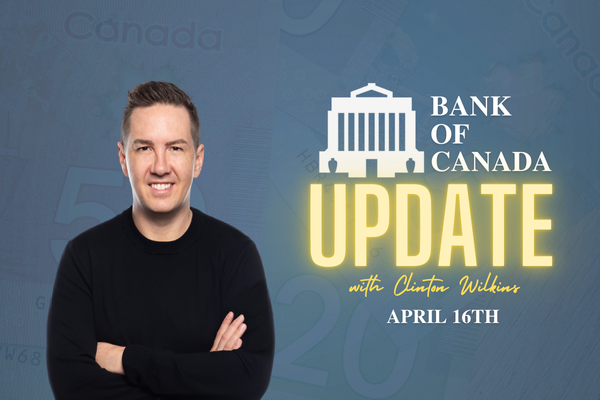On 95.7 News Radio, Clinton and Todd discussed the Yukon's government's new first-time home buyer program, offering low-interest loans to cover up to half of down payments while highlighting similar programs in Nova Scotia and New Brunswick.
Bank of Canada CityNews Ottawa – surprised with the rate increase | July 13, 2022
Clinton chats with CityNews host, Sam Laprade in Ottawa, our nations capital, about the Bank of Canada announcement. The Bank of Canada increased the key overnight rate by 100 basis points, and prime rate will now be 4.7 per cent for many lenders. This is the biggest increase since 1998 and many were surprised with the rate increase. Clinton and Sam talk about what this means for Canadians, and what you can do to better secure your financial situation.
Bank of Canada Announcement – July 13, 2022: Surprised with the rate increase
Don’t feel like watching the video? Check out the transcript below.
Transcript:
Surprised with the rate increase
Sam Laprade: [00:00:00.09] Well, I know I had July 13 circled on my calendar to find out what the Bank of Canada was going to do. And I know Clinton Wilkins also had this day circled on his calendar. Hi, Clinton.
Clinton Wilkins: [00:00:11.88] Hi, Sam. How are you?
Sam Laprade: [00:00:13.47] Good. Clinton is with Clinton Mortgages, of course, Clinton, Wilkins Mortgage Team. And Clinton, when I think about what today means for Canadians, we know that interest rate was hiked more than what we had anticipated, economists had told us. What did you hear when you heard the Bank of Canada report earlier this morning?
Clinton Wilkins: [00:00:34.26] I watched the press release live on the Internet. And, you know, I was surprised with 100 basis point increase. I think we all were, Sam. I have the date circled on my calendar a year in advance. We actually in December of the previous year, we program all of the bank account Canada announcements in my calendar. So we certainly were watching and very curious.
Obviously, this is a big impact to Canadians. If you’re in a variable rate mortgage product, if you have a home equity line of credit, if you have any unsecured debts that are tied to the prime rate, your cost of borrowing is going to go up. And I think everyone’s feeling the pinch right now. I’m certainly cognisant of it. You know, it’s the cost of fuel, and the cost of consumer goods obviously have gone up.
And right now it’s about $55 per $100,000, depending on your amortization, that a customer would have an increase in their mortgage payment on a monthly basis. So if a customer has a $500,000 mortgage, they’re paying almost $300 a month more now today than they were really yesterday.
What was the buzz leading up to the announcement?
Sam Laprade: [00:01:35.63] And Clinton, when I think about people and I don’t think this has ever happened to me in my life before, but certainly over the last month or so, knowing that this increase was coming, I found the conversations with my friends and family went to mortgages.
People say, “oh, I’m renewing in a year or, you know, I’m renewing in six months.” People very, very nervous about it. What was it like as, you know, as someone working in the mortgage world leading up to today?
Clinton Wilkins: [00:02:02.84] You know, there’s certainly a lot of conversation about mortgage lending in the media, also in our office, obviously, every single day. And it’s not just variable rate mortgages that are more expensive. Fixed rate mortgages are really some of the highest that I’ve seen. And I’ve been the industry for about 18 years. And I think that’s something that we need to really, really think about. You know, a lot of customers that take a variable rate mortgage, they took it because it was low, but they forget that it also is variable and what goes up must come down.
There was a really interesting article in the Financial Post today from an economist stating that every time or almost every time the bank had added kind of sharp increases in the key overnight rate, within 13 months, they started softening in them again. So the Bank of Canada is really hoping for a soft landing here, and it’s really going to depend on what happens with inflation.
But my theory is, if a household has $300 less maybe now because of their increased cost of borrowing, maybe they’ll spend $300 less on consumer goods and we’ll start, you know, reducing inflation in turn. The federal government, also on the July 13th today in the USA, the Fed, they released their inflation numbers and for June it exceeded what happened in May. So we’re certainly going to be keeping a close eye on what happens in the US as well.
Sam Laprade: [00:03:24.92] And this pandemic obviously has been very challenging on people.
Clinton Wilkins: [00:03:29.57] It certainly has.
What happens to people who can’t afford to wait it out until the prices go back down?
Sam Laprade: [00:03:30.92] Do you think, Clinton, that there are people that, and I hate even asking this question, but that may not be able to just make this until that rate comes down?
Clinton Wilkins: [00:03:41.24] Yeah, I think there certainly are some consumers in that case, and we certainly are talking to a lot of customers right now and very educated customers, Sam. Lawyers and doctors and people that you wouldn’t normally think would be, you know, impacted so significantly by inflation, but everyone is. It doesn’t matter what your socioeconomic standing really looks like.
What we’re really telling consumers in most cases, it doesn’t make sense to convert into a fixed. Now if you’re going to convert into a fixed, it’s going to be somewhere around 5 per cent, which is much more than what the variable rate mortgage product is today. But the customers that are really feeling the pinch, we are doing some financial planning type things with them and we’re doing some mid-term refinances to extend their amortization.
So if you’re in a situation where you have some equity in your home, we can refinance up to 80 per cent of the market value. And even if you’re not pulling any equity out, we can re-amortise your mortgage over a longer period of time. So some consumers are choosing to extend their amortization to 20, 25 or 30 years to reduce their cost of borrowing. It’s not for the long term, Sam. It’s a short term solution until inflation starts coming under control and until the rate starts softening again.
The increase starts today, or on the first of the next month
Sam Laprade: [00:04:55.79] And when does it come into effect? Is it today?
Clinton Wilkins: [00:04:59.87] It is today for many lenders. So the Bank of Canada increase the key overnight rate by 100 basis points, which really means today for many lenders, the primary will become 4.7. Some lenders will not start changing the cost of borrowing until the first the following month or August 1st. So you may have a two week buffer here, depending on which lender you’re with. Every lender kind of treats it a little bit different, but as of today, the cost of borrowing would be 1 per cent higher than it was yesterday.
Sam Laprade: [00:05:28.70] Wow. It’s such a big day for Canadians and for people that are looking to sort of, you know, get a new mortgage, let’s say that’s coming due in six months. Is it six months where they should start looking, Clinton, is that your advice?
Clinton Wilkins: [00:05:42.62] Six months you should start getting your paperwork together and start thinking about what your intentions are. But 120 days is typically when we start the process. So we’re talking to customers today that are renewing now in November. So I think that’s something to think about.
Some customers are choosing to do a mid-term refinance or a refinance, maybe early, or renewal early, to get a new term. In some cases that make sense. In some cases it doesn’t. I think it’s kind of a little bit of a case by case basis, but a little bit of food for thought: This 100 basis point increase at the Bank of Canada today was the biggest increase that they’ve done since 1998.
Sam Laprade: [00:06:19.76] Wow. Well, I honestly, I could talk mortgages all day with you.
Clinton Wilkins: [00:06:23.75] I mean, so could I! Luckily I’m in the industry and I get to have some air time once in a while.
Sam Laprade: [00:06:29.12] There you go. And Clinton, we course we love your show here on CityNews Mortgage 101. It’s an important show, especially, well now more than ever. Clinton, thank you so much for your time.
If you have any questions, get in touch with us at Clinton Wilkins Mortgage Team! You can call us at (902) 482-2770 or contact us here.


